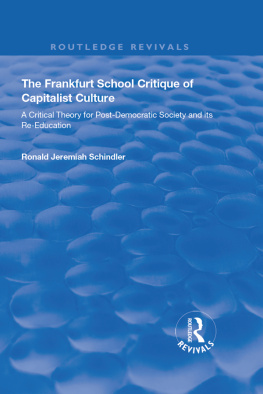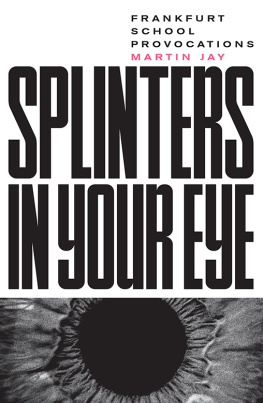Frankfurt - The Reasons of Love
Here you can read online Frankfurt - The Reasons of Love full text of the book (entire story) in english for free. Download pdf and epub, get meaning, cover and reviews about this ebook. year: 2008, publisher: Princeton University Press, genre: Science. Description of the work, (preface) as well as reviews are available. Best literature library LitArk.com created for fans of good reading and offers a wide selection of genres:
Romance novel
Science fiction
Adventure
Detective
Science
History
Home and family
Prose
Art
Politics
Computer
Non-fiction
Religion
Business
Children
Humor
Choose a favorite category and find really read worthwhile books. Enjoy immersion in the world of imagination, feel the emotions of the characters or learn something new for yourself, make an fascinating discovery.
The Reasons of Love: summary, description and annotation
We offer to read an annotation, description, summary or preface (depends on what the author of the book "The Reasons of Love" wrote himself). If you haven't found the necessary information about the book — write in the comments, we will try to find it.
The Reasons of Love — read online for free the complete book (whole text) full work
Below is the text of the book, divided by pages. System saving the place of the last page read, allows you to conveniently read the book "The Reasons of Love" online for free, without having to search again every time where you left off. Put a bookmark, and you can go to the page where you finished reading at any time.
Font size:
Interval:
Bookmark:
The Reasons of Love
The Reasons of Love
Harry G. Frankfurt
Princeton University Press
Princeton and Oxford
Copyright @ 2004 by Princeton University Press
Published by Princeton University Press,
41 WilliamS treet, Princeton, New Jersey 08540
In the United Kingdom: Princeton University Press,
3 Market Place, Woodstock, Oxfordshire OX20 1SY
ALL RIGHTS RESERVED
Library of Congress Cataloging-in-Publication Data
Frankfurt, Harry G., 1929
The reasons of love / Harry G. Frankfurt
p. cm.
Includes bibliographical references.
eISBN: 978-1-40082-606-3
1. Practical reason. 2. Love. I. Title.
BC177.F69 2004
177'.7dc21 2003050428
British Library Cataloging-in-Publication Data is available
This book has been composed in Adobe Caslon
Printed on acid-free paper.
www.pupress.princeton.edu
Printed in the United States of America
1 3 5 7 9 10 8 6 4 2
Contents
The Reasons of Love
One
The Question: How Should We Live?
1We have it on the authority both of Plato and of Aristotle that philosophy began in wonder. People wondered about various natural phenomena that they found surprising. They also puzzled over what struck them as curiously recalcitrant logical, or linguistic, or conceptual problems that turned up unexpectedly in the course of their thinking. As an example of what led him to wonder, Socrates mentions the fact that it is possible for one person to become shorter than another without shrinking in height. We might wonder why Socrates should have been made at all uncomfortable by such a shallow paradox. Evidently the problem struck him not only as more interesting, but also as considerably more difficult and disturbing, than it strikes us. Indeed, referring to this problem and others like it, he says, Sometimes I get quite dizzy with thinking of them.
Aristotle gives a list of several rather more compelling examples of the sorts of things by which the first philosophers were led to wonder. He mentions self-moving marionettes (apparently the Greeks had them!); he mentions certain cosmological and astronomical phenomena; and he mentions the fact that the side of a square is incommensurable with the diagonal. It is hardly appropriate to characterize these things merely as puzzling. They are startling. They are marvels. The response they inspired must have been deeper, and more unsettling, than simplyas Aristotle puts ita wondering that the matter is so. It must have been resonant with feelings of mystery, of the uncanny, of awe.
Whether the earliest philosophers were trying to fathom the secrets of the universe, or just trying to figure out how to think clearly about some quite ordinary fact or how to express some commonplace observation accurately, Aristotle reports that their inquiries had no further and more practical goals. They were eager to overcome their ignorance, but that was not because they thought they needed the information. In fact, their ambition was exclusively speculative or theoretical. They wanted nothing more than to dispel their initial surprise that things are as they are, by developing a reasoned understanding of why it would be unnaturalor even impossiblefor things to be any other way. When it becomes clear that something was only to be expected, that dissipates whatever sense of surprise it may initially have engendered. As Aristotle remarks concerning right triangles, there is nothing which would surprise a geometer so much as if the diagonal turned out to be commensurable.
I am going to be concerned here with, among other things, certain discomforts and disturbances by which human beings are rather typically beset. These differ both from the sorts of discomforts and disturbances that may be caused by logical difficulties, such as the one Socrates mentions, and from those that tend to arise in response to features of the world like those on Aristotles list. They are more practical and, because they pertain closely to our interest in trying to manage our lives sensibly, more urgent. What presses us to inquire into them is not disinterested curiosity, or puzzlement, or wonder, or awe. It is psychic distress of another variety altogether: a kind of nagging anxiety, or unease. The difficulties we encounter in thinking about these things may sometimes, per haps, make us dizzy. They are more likely, however, to cause us to feel troubled, restless, and dissatisfied with ourselves.
The topics to which this book is devoted have to do with the ordinary conduct of life. They pertain, in one way or another, to a question that is both ultimate and preliminary:how should a person live? Needless to say, this is not a question of only theoretical or abstract interest. It concerns us concretely, and in a very personal way. Our response to it bears directly and pervasively upon how we conduct ourselvesor, at least, upon how we propose to do so. Perhaps even more significantly, it affects how we experience our lives.
When we seek to understand the world of nature, we do so at least partly in the hope that this will enable us to live within it more comfortably. To the extent that we know our way around our environment, we feel more at home in the world. In our attempts to settle questions concerning how to live, o n the other hand, what we are hoping for is the more intimate comfort of feeling at home with ourselves.
2Philosophical issues pertaining to the question of how a person should live fall within the domain of a general theory of practical reasoning. The term practical reasoning refers to any of the several varieties of deliberation in which people endeavor to decide what to do, or in which they undertake to evaluate what has been done. Among these is the particular variety of deliberation that focuses especially upon problems of moral evaluation. This species of practical reasoning naturally receives, fr om philosophers and from others as well, a great deal of attention.
It is unquestionably important for us to understand what the principles of morality require, what they endorse, and what they forbid. It goes without saying that we need to take moral considerations seriously. In my opinion, however, the importance of morality in directing our lives tends to be exaggerated. Morality is less pertinent to the shaping of our preferences and to the guidance of our conductit tells us less of what we need to know about what we should value and how we should livethan is commonly presumed. It is also less authoritative. Even when it does have something relevant to say, it does not necessarily have the last word. With regard to our interest in the sensible management of those aspects of our lives that are normatively significant, moral precepts are both less comprehensively germane and less definitive than we are often encouraged to believe.
People who are scrupulously moral may nonetheless be destined by deficiencies of character or of constitution to lead lives that no reasonable person would freely choose. They may have personal defects and inadequacies that have nothing much to do with morality but that make it impossible for them to live well. For example, the y may be emotionally shallow; or they may lack vitality; or they may be chronically indecisive. To the extent that they do actively choose and pursue certain goals, the y may devote themselves to such insipid ambitions that their experience is generally dull and without flavor. In consequence, their lives may be relentlessly banal and hollow, andwhether or not they recognize this about themselvesthey may be dreadfully bored.
There are those who maintain that people who are not moral cannot be happy. Perhaps it is true that being moral is an indispensable condition for a satisfying life. It is certainly not, however, the only condition that is indispensable. Sound moral judgment is not even the only condition that is indispensable in evaluating courses of conduct. Morality can provide at most only a severely limited and insufficient answer to the question of how a person should live.
Next pageFont size:
Interval:
Bookmark:
Similar books «The Reasons of Love»
Look at similar books to The Reasons of Love. We have selected literature similar in name and meaning in the hope of providing readers with more options to find new, interesting, not yet read works.
Discussion, reviews of the book The Reasons of Love and just readers' own opinions. Leave your comments, write what you think about the work, its meaning or the main characters. Specify what exactly you liked and what you didn't like, and why you think so.











